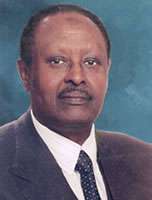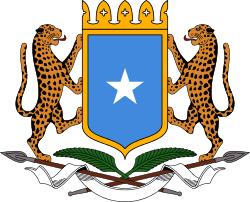Muhammad Haji Ibrahim Egal
| Mohamed Haji Ibrahim Egal محمد الحاج ابراهيم عقال | |
|---|---|
 | |
| 2nd President of Somaliland | |
|
In office May 16, 1993 – May 3, 2002 | |
| Vice President |
Abdirahman Aw Ali Farah (1993-1997) Ahmed Yusuf Yasin (1997-2002) |
| Preceded by | Abdirahman Ahmed Ali Tuur |
| Succeeded by | Dahir Riyale Kahin |
| Prime Minister of the State of Somaliland | |
|
In office June 26, 1960 – July 1, 1960 | |
| Preceded by | Sir Douglas Hall (as Governor) |
| Succeeded by | (none) |
| 4th Prime Minister of Somalia | |
|
In office July 15, 1967 – October 21, 1969 | |
| Preceded by | Abdirizak Haji Hussein |
| Succeeded by | Muhammad Ali Samatar |
| Acting Prime Minister of Somalia | |
|
In office July 1, 1960 – July 12, 1960 | |
| Succeeded by | Abdirashid Ali Shermarke |
| Personal details | |
| Born |
August 15, 1928 Odweyne, British Somaliland |
| Died |
May 3, 2002 (aged 73) Pretoria, South Africa |
| Political party |
United Peoples' Democratic Party Somali Youth League |
| Spouse(s) |
(1) Edna Adan (2) Asha Saeed Aabi (3) Hawa Ainab (4) Kaltum Haji Dahir |
| Religion | Sunni Islam |
Mohamed Haji Ibrahim Egal (Somali: Maxamed Xaaji Ibraahim Cigaal, Arabic: محمد الحاج ابراهيم ايغال) (August 15, 1928 - May 3, 2002) was a Somali politician. He was the Prime Minister of Somalia during the early and late 1960s. He also served as the President of Somaliland, a self-declared republic that is internationally recognized as an autonomous region of Somalia, from 1993 to 2002.[1]
Early years
Egal was born in 1928 in the northwestern town of Oodweyne, then a part of the British Somaliland protectorate. He hailed from a Habar Awal Isaaq family.
For his elementary studies, Egal attended primary school in Berbera and Burao. He attended Sheikh Intermediate School in Sheekh. After graduation, he went to England for further studies.[2]
Career
Civilian administration
Egal initially worked as an unofficial member of the former British Somaliland protectorate's Executive Council, and was the Leader of Government Business in the Legislative Council. For five days in June 1960, he served as the Prime Minister of the briefly-extant State of Somaliland (the former British Somaliland) during its planned transition to union with the Trust Territory of Somalia (the former Italian Somaliland) to form the Somali Republic.[3]
Following Somalia's independence on July 1, 1960, Egal became the first national Minister of Defense (1960-1962). In 1962, he left the government to form the opposition Somali National Congress. Two years later he joined the Somali Youth League, the majority party in the government at that point. In 1967, Abdirashid Ali Shermarke was elected President and he appointed Egal as the Prime Minister.[4]
He was still the Prime Minister and in Washington D.C. when President Abdirashid Ali Shermarke was assassinated on October 15, 1969. Shortly afterward, the newly established Supreme Revolutionary Council (SRC) led by Major General Siad Barre, Brigadier General Mohamed Ainashe Gule, Lieutenant Colonel Salaad Gabeyre Kediye and Chief of Police Jama Korshel seized power.[5] The SRC subsequently renamed the country the Somali Democratic Republic,[6][7] arrested members of the former civilian government, banned political parties,[8] dissolved the parliament and the Supreme Court, and suspended the constitution.[9] Egal was among the politicians detained by the SRC for his prominent role in the nation's early government. He was eventually released and was named the Ambassador to India (1976-1978) before the Barre regime imprisoned him again on charges of conspiracy until 1985.[4]
When the Barre regime eventually collapsed in 1991 with the start of the civil war, local leaders in north Somalia declared the region independent. Although Egal initially opposed their self-proclaimed secession, he was elected president of the new Somaliland polity two years later by a regional council of elders.
President of Somaliland
During his tenure as President of Somaliland, Egal managed to disarm local rebel groups, stabilized the northwestern Somaliland region's economy, and established informal trade ties with foreign countries. He also introduced the Somaliland shilling, passport and flag. In addition, Egal helped create the Somaliland army, one of the more effective armed forces in Somalia.
Throughout his term as president of the Somaliland region, Egal's dedication to the secessionist cause was doubted and challenged by hardliners, particularly within the Somali National Movement (SNM), who believed that he still ultimately hoped to reconcile with other political actors in the rest of Somalia. In August 2001, Egal survived by one vote a motion tabled by several regional MPs charging him of half-heartedly pursuing separatism.[10] In an interview with IRIN the same year, SNM leader Abdirahman Awale also said of Egal that "when he says he is for independence, it is for local consumption only. He tells the people here one thing, but in his speeches elsewhere he has clearly declared that Somalia will unite one day. He says we will talk to the southerners when they make their home clean and negotiate with them... He says one thing to the public, and a different thing to the international community."[11]
Death
Egal died on May 3, 2002 in Pretoria, South Africa while undergoing surgery at a military hospital. His body was returned to Somaliland for a state funeral, whereafter his three sons laid him to rest next to his father, in accordance with his last wishes. Around 4,000 mourners reportedly attended his burial in Berbera, and the regional parliament declared seven days of mourning. However, Somaliland flags did not fly at half-staff since the emblem on them includes the Shahadah, Islam's holiest words. Dahir Rayale Kahin was sworn in the next day as the new president.[12]
On May 4, 2013, a large gathering was held at the Mansoor Hotel in Hargeisa to commemorate the 11 year anniversary of Egal's death.
References
- ↑ Somaliland’s Quest for International Recognition and the HBM-SSC Factor
- ↑ Hassan, Samiira. http://forgottendiaries-ethiopia.blogspot.com/2009/05/political-legacy-of-mohamed-ibrahim.htm. Retrieved April 23. Check date values in:
|access-date=(help); Missing or empty|title=(help) - ↑ Paolo Contini, The Somali Republic: an experiment in legal integration, (Routledge, 1969), p.6.
- 1 2 Greenfield, Richard (May 8, 2002). "Obituary: Mohamed Ibrahim Egal". The Independent.
- ↑ Adam, p.226
- ↑ J. D. Fage, Roland Anthony Oliver, The Cambridge history of Africa, Volume 8, (Cambridge University Press: 1985), p.478.
- ↑ The Encyclopedia Americana: complete in thirty volumes. Skin to Sumac, Volume 25, (Grolier: 1995), p.214.
- ↑ Metz, Helen C. (ed.) (1992), "Coup d'Etat", Somalia: A Country Study, Washington, D.C.: Library of Congress.
- ↑ Peter John de la Fosse Wiles, The New Communist Third World: an essay in political economy, (Taylor & Francis: 1982), p.279.
- ↑ Africa contemporary record: annual survey and documents, Volume 28. Africana Publishing Co. 2006. pp. B–525.
|first1=missing|last1=in Authors list (help) - ↑ "Somalia: IRIN interview with Somali National Movement (SNM)". IRIN. Retrieved 2 September 2012.
- ↑ "Somaliland leader buried". BBC News. May 6, 2002.
External links
| Wikimedia Commons has media related to Muhammad Haji Ibrahim Egal. |
| Political offices | ||
|---|---|---|
| New title | Prime Minister of the State of Somaliland 1960 |
Somaliland merged with Somalia |
| New title | Prime Minister of Somalia 1960 |
Succeeded by Abdirashid Ali Shermarke |
| Preceded by Abdirizak Haji Hussein |
Prime Minister of Somalia 1967 – 1969 |
Succeeded by Mohamed Farah Salad |
| Preceded by Abdirahman Ahmed Ali Tuur |
President of Somaliland 1993 – 2002 |
Succeeded by Dahir Riyale Kahin |
